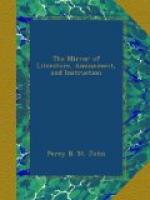We have seen rather a curious document, drawn up by some of the chief growers of fruit and vegetables in the villages round London. It is stated on the authority of twenty-one such persons, whose names are appended, that up to July the 24th (when it is dated,) of 1,010 labourers of either sex employed in their gardens, one only was indisposed, and not one had had cholera. Their inference is that fruit and vegetables are not favourable to the production of that disease; but it does not appear to us that the premises warrant the conclusion. Is it the fact that those labourers eat a larger portion of fruit and vegetables than others? It is notorious, with regard to pastrycooks, confectioners, and such persons, that they do not consume more—if so much—of their commodities as others; and certainly persons so situated as the thousand and ten abovementioned are much less likely than others to commit any excess in regard to the articles in question. It is not against the use, but the abuse of “the kindly fruits of the earth,” that we protest; and we are quite sure that many cases of cholera have been produced by unripe fruit and raw vegetables (as cucumbers,) taken even in moderate quantity; and that great caution is necessary in this respect, notwithstanding the declaration of the growers.—Medical Gazette.
* * * * *
THE GATHERER.
* * * * *
Olive Oil.—The amount of duties paid on olive oil imported into the United Kingdom, from January 5, 1831, to April 5, 1832, was L76,962. The quantity of this oil imported in that period was 2,286,629 gallons—Med. and Surg. Journal.
Coffee.—The duty on raw coffee is now 6_d_. per lb. on colonial, and 9_d_. on foreign; the retail price is 2_s_. to 4_s_.
The Irish Bar.—Mr. Dundas, a keen, sarcastic man, who loved his bottle nearly as well as Sir Hercules Langreish, invited the baronet to a grand dinner in London, where the wine circulated freely, and wit kept pace with it. Mr. Dundas, wishing to procure a laugh at Sir Hercules, said, “Why, Sir Hercules, is it true that we Scotch formerly transported all our criminals and felons to Ireland?” “I dare say,” replied Sir Hercules; “but did you ever hear, Mr. Dundas, of any of your countrymen returning to Scotland from transportation.”
Lord Byron’s opinion of Earl Grey.—“Madame de Stael was forcibly struck by the factitious tone of the best society in London, and wished very much to have an opportunity of judging of that of the second class. She, however, had not this opportunity, which I regret, as I think it would have justified her expectations. In England, the raw material is generally good; it is the over-dressing that injures it; and as the class she wished to study are well educated, and have all the refinement of civilization




